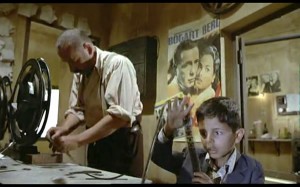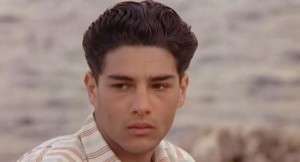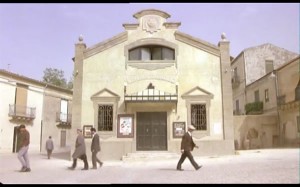 Most of the story is told in flashback. It begins with a man, Salvatore, hearing the news of a death of a man called Alfredo. He then reminisces over this father-figure, a man whom he knew as a child and teen who taught him to be a cinema projectionist. As a teen he also falls for a girl who moves away. Alfredo, for fear he should stagnate the rest of his life in the small Sicilian village as he feels he himself has done, urges Salvatore to leave the village and find his fame and fortune in Rome! Now, thirty years later and as a famous film director, Salvatore (aka Toto) returns to the village to attend Alfredo’s funeral and reflects on what has been and could have been in life and love.
Most of the story is told in flashback. It begins with a man, Salvatore, hearing the news of a death of a man called Alfredo. He then reminisces over this father-figure, a man whom he knew as a child and teen who taught him to be a cinema projectionist. As a teen he also falls for a girl who moves away. Alfredo, for fear he should stagnate the rest of his life in the small Sicilian village as he feels he himself has done, urges Salvatore to leave the village and find his fame and fortune in Rome! Now, thirty years later and as a famous film director, Salvatore (aka Toto) returns to the village to attend Alfredo’s funeral and reflects on what has been and could have been in life and love.
This is a coming of age film mixed with a healthy dose of hindsight in the final part. Time and generation are beautifully represented by the cinema which is finally usurped by the younger television. Similar, subtler themes are at work in the background highlighting the debt to generations before. From Italy’s war dead who are now shunned into the back of peoples memories, to the films shown at the Paradiso – film pioneers like Chaplin appearing in “Modern Times” a nice touch!
 Like most films there are several different versions or cuts. The most famous and successful version was reduced by 30 minutes. However I would urge you to watch the longer 153 minute version as the additional story, which principally happens on his return after 30 years, transforms the film to a more bittersweet level and we are left with slightly altered opinions about the characters. It is less formulaic than the edited down version and so adds to the charm of the film. After all, life isn’t perfect and “happy ever after!” – as Alfredo is clear to point out to Salvatore “Life is not what you see in films – Life is much harder“.
Like most films there are several different versions or cuts. The most famous and successful version was reduced by 30 minutes. However I would urge you to watch the longer 153 minute version as the additional story, which principally happens on his return after 30 years, transforms the film to a more bittersweet level and we are left with slightly altered opinions about the characters. It is less formulaic than the edited down version and so adds to the charm of the film. After all, life isn’t perfect and “happy ever after!” – as Alfredo is clear to point out to Salvatore “Life is not what you see in films – Life is much harder“.
 Perhaps this is why the director originally feared to edit too much. Life isn’t about a series of moments that can be spliced together, though it would be good if it were! Nor can it be censored no matter how much we would like to pretend things are no longer there! The ending reminds us of this and is made more poignant by the extended story line, a release for all the bottled emotion that precedes it. I wouldn’t want to give it away but as I watched I remembered another quote from the film LA Story “A kiss may not be the truth, but it is what we wish were true“.
Perhaps this is why the director originally feared to edit too much. Life isn’t about a series of moments that can be spliced together, though it would be good if it were! Nor can it be censored no matter how much we would like to pretend things are no longer there! The ending reminds us of this and is made more poignant by the extended story line, a release for all the bottled emotion that precedes it. I wouldn’t want to give it away but as I watched I remembered another quote from the film LA Story “A kiss may not be the truth, but it is what we wish were true“.
[rating=5] Cinema Paradiso (4 Disc Deluxe Edition Box Set) [1989] [DVD]